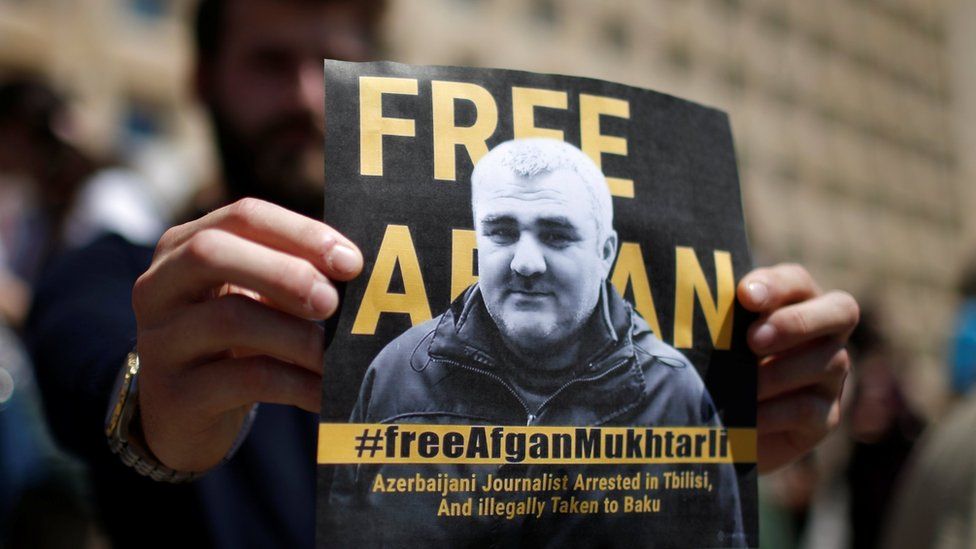Afgan Mukhtarli: Did Georgia help abduct an Azeri journalist?
- Published

The disappearance of an Azeri opposition journalist in the streets of the Georgian capital Tbilisi has caused an outcry in a country which prides itself on championing democracy. The BBC's Rayhan Demytrie reports from the South Caucasus.
On 29 May, Afgan Mukhtarli went to meet a friend in a cafe in Tbilisi. He rang his wife Leyla Mustafayeva at about 19:00 to say that he was heading back home.
But Mr Mukhtarli, an Azeri journalist who had been living in self-imposed exile in Georgia since 2015, never showed up.
"I thought that the worst had happened, that he had been killed and dumped in the woods," says Leyla, speaking from the leafy garden of her small one-storey house in central Tbilisi.
Afgan Mukhtarli was an outspoken critic of the Azeri government. Before fleeing the country, he had carried out a series of investigations exposing corruption in the defence ministry.
"In 2014 the Azeri government intensified pressure on its critics. Khadija Ismayilova, a journalist Afgan used to work with, was arrested, then the government shut down Radio Liberty, and Afgan was questioned in relation to that case," Leyla explains.
Georgia, which has a liberal visa policy, became a destination of choice for many Azeri political activists and journalists.
At the time of his disappearance, Mr Mukhtarli had been investigating the business holdings of the family of Azeri President Ilham Aliyev in Georgia, on behalf of the Organized Crime and Corruption Reporting Project (OCCRP).
The morning after his alleged abduction, Leyla received news that her husband had resurfaced in Azerbaijan and was in police custody there.
"I was so happy... at least he was alive."
Through his lawyer in the Azeri capital Baku, Mr Mukhtarli claimed that he was kidnapped by men in Georgian police uniforms, who beat him in the car, put a hood on his head, stuffed his pockets with money and handed him over to Azeri state security officers.
Georgian Prime Minister Giorgi Kvirikashvili categorically denied the involvement of any Georgian state bodies.
In neighbouring Azerbaijan, border officials and the prosecutor general say Mr Mukhtarli was caught illegally crossing the Georgian-Azeri border while carrying large sums of undeclared money.
He is now in three months of pre-trial detention in Baku, facing criminal charges.
'Democracies don't do that'
In Georgia the news of the alleged abduction and claims that Georgian authorities had been complicit triggered a public outcry.
"It is well documented that people can disappear in Russia and then reappear somewhere in Central Asia, but nobody expected such an incident in Georgia," says Giorgi Gogia, the South Caucasus country director for Human Rights Watch.
"If you claim to be a democracy where human rights are respected you don't do that. There is due process, there should be an extradition request and courts should make the decision."
Several protests were staged in Tbilisi, some demonstrators wearing bags over their heads in solidarity with Mr Mukhtarli.
The gesture was repeated by popular TV show host Giorgi Gabunia - he wore a black sack over his head while conducting an interview with Deputy Interior Minister Shalva Khutsishvili. The minister left the interview in protest.
In a written statement to the BBC, Mr Khutsishvili said the Georgian interior ministry was investigating how Mr Mukhtarli had reached the Georgian-Azeri border and whether he had acted voluntarily or under duress.
Trade partners
"I completely rule out any illegal connection of Georgian law enforcement agents with this story," the deputy minister said.
Georgian investigators have asked the Azeri authorities for permission to speak to Mr Mukhtarli directly. Without such evidence, Mr Khutsishvili says, "it would be inappropriate" to make the findings of their investigations public.
Azerbaijan is among Georgia's top trading partners and a key energy supplier. More than 90% of the natural gas used by Georgians comes from Azerbaijan, and it also exports petrol and diesel.
Azerbaijan also depends on Georgia for its oil exports to Europe. The Baku-Tbilisi-Ceyhan (BTC) oil pipeline, one of the longest in the world, runs through Georgia and is one of Azerbaijan's main sources of revenue.
Afgan Mukhtarli's pre-trial detention will expire on 29 August.
His lawyer, Elchin Sadiqov, says that he is suffering from diabetes and high blood pressure, and has lost 16kg (35lb) since his detention in late May.